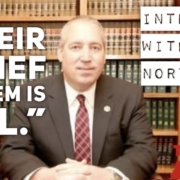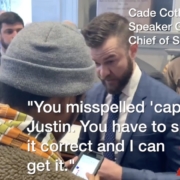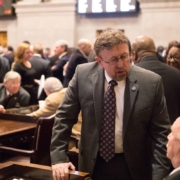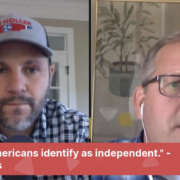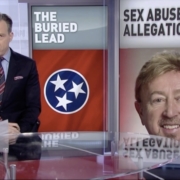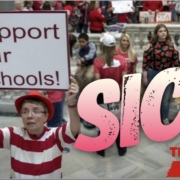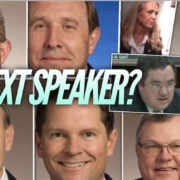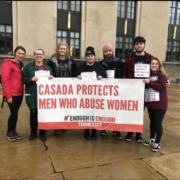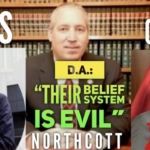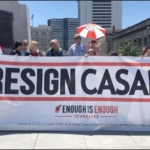Our Conversation With Casada-Jones Special Prosecutor Craig Northcott About His Comments About Muslims
Yesterday we posted an article about a Facebook conversation between the Special Prosecutor now in charge of the Speaker Casada-Justin Jones investigation, Coffee County District Attorney Craig Northcott, and Daniel Berry, chair of the Coffee County Young Republicans. The conversation was about Muslims, and Islam.
Northcott repeatedly used the word “evil” when referring to Muslims and their belief system.
It has also come to our attention that Northcott believes protesting NFL players kneeling during the National Anthem was “an attack on Christianity”.
Justin Jones, the subject of the investigation Northcott is now in charge of, is not a Muslim, but he is a civil rights activist who fights for the rights of minorities. Northcott’s Islamophobia and attitude towards players protesting for civil rights has led many to wonder if Northcott is the right person to be in charge of the investigation, and if all citizens in Coffee County can expect to be treated fairly by him.
The American Muslim Advisory Council does not think so.
We spoke with Northcott yesterday morning, before our article posted. Below is our conversation in its entirety.
HOLLER: We’re going to be running a story about a conversation you had on Facebook with Daniel Berry about your views about Islam and Muslims, and we just wanted to give you a chance to explain where you’re coming from with that?
NORTHCOTT: I’m coming from that as a Christian there’s only one true God, and that is the God of the Bible.
HOLLER: And if there are Muslims in your community, do you think they should be concerned about their ability to get fair treatment from you?
NORTHCOTT: I don’t see any reason why they would be. The laws protect everyone equally. I judge each situation based upon the facts and circumstances of each situation and everyone gets equal treatment.
HOLLER: But you’re calling them “evil” in these messages.
NORTHCOTT: I don’t have it in front of me. Their ideology is evil. If they hold to that ideology that is taught in their holy scriptures, I think I made it clear the ideology is the problem, and you assess each individual as you find them. But the ideology is evil.
HOLLER: But your words were actually that it wasn’t just violent extremists that are evil, what you said was “They’re evil because they profess a commitment to an evil belief system. They’re no less evil because they don’t act on their belief system if they refuse to disavow that system” – So it sounds like what you’re saying is they’re evil if they don’t disavow Islam.
NORTHCOTT: Listen, I don’t know how else to say it. You’re going to say what you want to say. I’m a Christian. I believe in Christian values, and there’s only one true God. And any belief system that purports hate – killing anyone who does not comply with that belief system – is evil. I don’t know how else to say it… If you promote that you kill anyone who doesn’t believe what you believe that is evil. If that is what you truly believe you believe in an evil system. And that’s what the Muslim, Islam ideology is, and that is evil. If you don’t profess that, great. If you disavow that, great. But that is what is taught in Islam.
HOLLER: The discrepancy seems to be that – what Daniel was saying is that there are people who are violent and that are Muslims, and that that is evil, but that there are also peaceful Muslims who don’t ascribe to that, but you seemed to keep saying that if you believe in Islam, if you’re a Muslim, that because there are sects of Islam that believe in violence that that makes them a party to it.
NORTHCOTT: Let me say this again – let’s take it out of the context of Islam. Let’s put it in the context of white supremacy. If you believe in white supremacy, and you promote and avow that that is your belief system, that you hate someone who is not white, that is evil. You are tying yourself to an evil system. The ideology is evil. Whether you act on that or not, you still believe in an evil system.
HOLLER: But the equivalency that you’re making at the root of that is that believing in Islam, being Muslim, and being a white supremacist, are on the same level.
NORTHCOTT: I did not equate them. I said let’s take it out of that context. I in no way equated them.
HOLLER: But the point is that you are equating them, because you’re saying…
NORTCOTT: I am not equating them! Let me be very clear. I am not equating them. So don’t put those words in my mouth. I am not equating them.
HOLLER: Sir, your words were…
NORTHCOTT: Listen, if you’re going to try to misconstrue stuff I’m just going to stop talking to you.
HOLLER: I’m not misconstruing anything, I’m replying to your words. Your words were “It is no different than being part of the KKK, aryan nation…”
NORTHCOTT: I did not say that!
HOLLER: You wrote it.
NORTHCOTT: No.
HOLLER: You did.
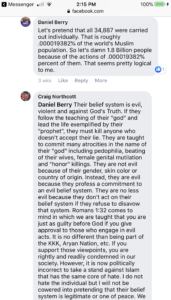
NORTHCOTT: You can misconstrue it all you want. If you want to report fairly, report fairly. If you don’t, I’m not going to talk to you anymore. That’s just the bottom line.
HOLLER: I’m reading the words that you wrote.
NORTHCOTT: I don’t even have it in front of me! There’s a whole context. There’s a whole string of stuff. And I am telling you what I am expressing. If you don’t want to accept that that’s fine, and I will just stop talking to you.
HOLLER: I very much want to get to the bottom of it. I’m trying to give you a chance to explain it.
NORTHCOTT: I just did.
HOLLER: Ok. If you’re someone who’s Muslim looking at these words here – they are painting all of Islam with that brush.
NORTHCOTT: All of Islam is to be painted with that brush. Each individual is to be treated separately. I say that clearly in there. I don’t know how else to say it.
HOLLER: I think Muslims would take exception to the first part.
NORTHCOTT: I can’t help that.
HOLLER: Do you believe this makes it difficult for you to do your job?
NORTHCOTT: No. It in no way affects how I judge each situation. Why would it?
HOLLER: Because if you start out with the premise that people who believe in a certain religion are evil and have an evil ideology, it seems like that would make it difficult to judge fairly.
NORTHCOTT: Why?
HOLLER: Because it seems like you would not be giving them the benefit of any doubt.
NORTHCOTT: Why?
HOLLER: Because you started out with the premise that they’re evil.
NORTHCOTT: I started out with the premise that the KKK is evil, can I not be fair to them either? There’s a lot of evil in this world. I start out with the premise that if you shoot someone in the head you’ve done an evil thing, can I not be fair to them?
HOLLER: Again, you just went from – we were talking about Muslims – to the KKK. You just made that jump yourself, you’re doing it yourself. I didn’t make you do that.
NORTHCOTT: You pick what you think’s evil. I’m trying to pick something that is clearly evil. You pick what you think is evil. What’s evil?
HOLLER: I agree that the Klan is evil.
NORTHCOTT: Ok! That’s why I picked it.
HOLLER: But I don’t agree that all of Islam is evil. Do you see what I’m saying?
NORTHCOTT: The ideology is evil. If you believe every bit of Islam, you are assigning yourself to an evil ideology. It’s just a fact. If you are believing in an ideology that promotes killing someone who doesn’t believe what you believe, that is evil. Do you agree with that?
HOLLER: Yes.
NORTHCOTT: Ok, there you go.
HOLLER: But what I think a lot of people would have a problem with is… there are things in the Bible that are violent also, are there not?
NORTHCOTT: There’s plenty of stuff in Bible that’s violent. But it doesn’t promote hate. It doesn’t say “kill those who don’t believe you, kill those who reject Christ” – it does not promote that in any way.
HOLLER: I understand, but I think the issue is that if you are saying that Muslims in general believe…
NORTHCOTT: I did not say that.
HOLLER: You said they believe in an evil ideology.
NORTHCOTT: Yes. That ideology is evil because it promotes hate. What does this have to do with anything of Justin Jones, is he a Muslim?
HOLLER: No, he’s not a Muslim.
NORTHCOTT: Well then what does this have to do with what you’re calling me about?
HOLLER: Because he fights for the rights of minorities, and he’s a civil rights activist, and I think it’s worth people understanding that the man who is now in charge of this investigation harbors these beliefs.
NORTHCOTT: Don’t misconstrue what I have to say.
HOLLER: I’m not misconstruing anything. These are your words. This is why I’m calling you.
NORTHCOTT: Let me be very clear – this is the last thing I’m going to say on this. There is a difference between ideology and the individual. I will judge each individual, and each circumstances as I find them. They’re two separate things.
HOLLER: Ok, and to clarify – the point you made about that “there are no constitutional rights, there are God-given rights protected by the constitution, and if you don’t believe in the one true God there’s nothing to protect. No one other than God has given us any rights” – is that something you want to elaborate on a little bit?
NORTHCOTT: You go to our founding documents and it makes it very clear that what is being protected by our Constitution is what God has provided to us – the right to life, the right to liberty, the right to the pursuit of happiness – and those are delineated in our founding documents. And they are specific in our founding documents that they come from our creator. And our Government is established to protect those rights for everyone.
HOLLER: To see the sentence “there are no constitutional rights” I think is shocking to some people who may not have the same outlook on that as you.
NORTHCOTT: Rights are not established by government, the rights are protected by government. That is the distinction I was making. Rights are created by God. They are God-given rights. And they are protected by the constitution.
Thanks for reading! We’re an independent, reader-supported site that depends entirely on you to help us keep holding our public officials accountable and “Yelling the Truth”, so please consider chipping in a $3, $5, or $10 monthly and we’ll keep telling the stories nobody else will:

